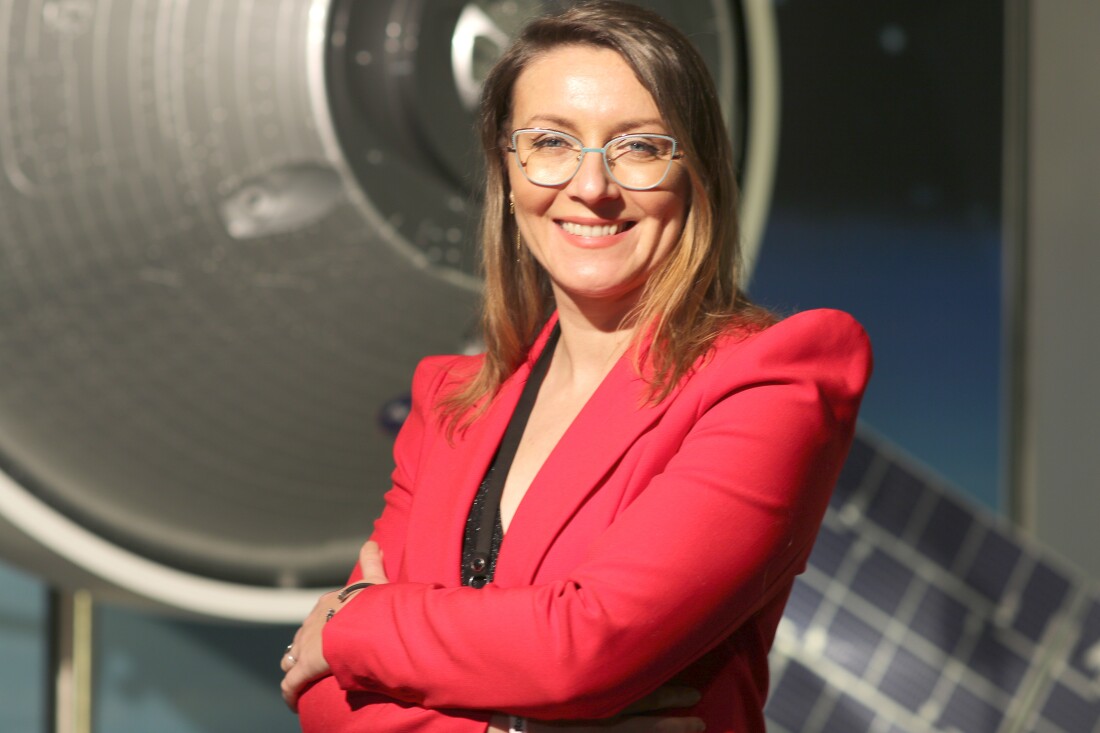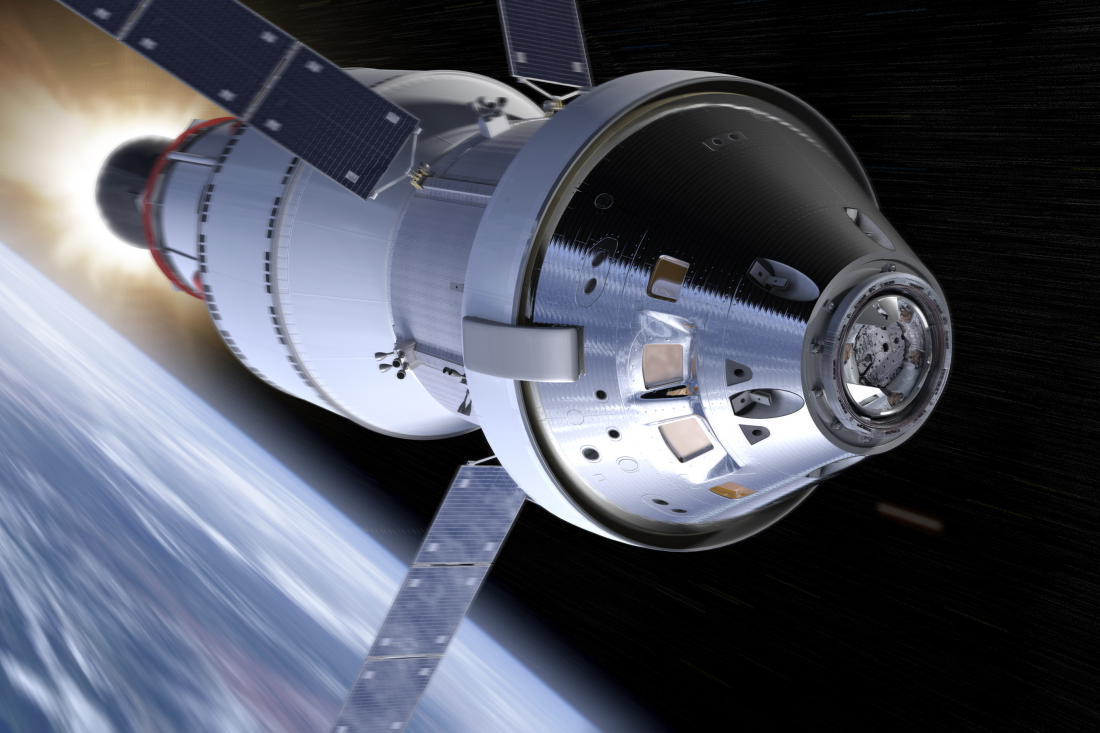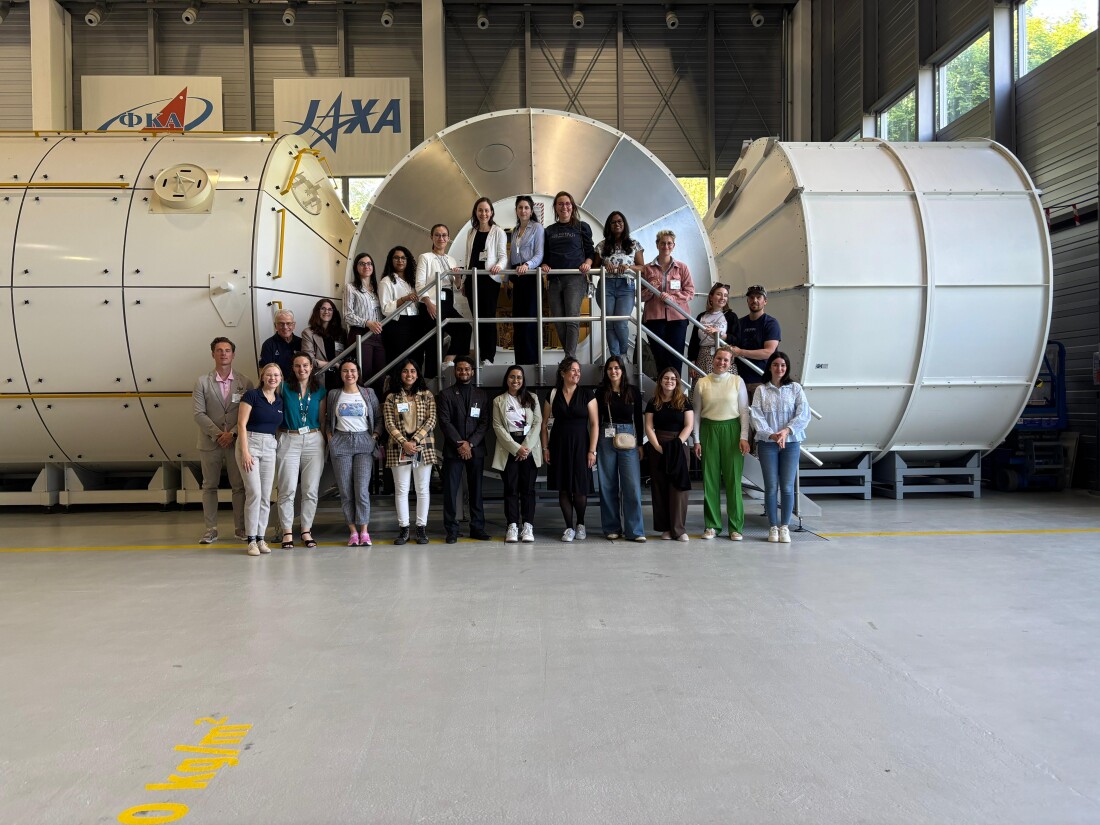How a space enthusiast campaigns for women in STEM fiels and Bremen as a space location
AerospaceAerospace engineer Dr. Anna Chrobry on diversity, Bremen as a space city, and reaching for the stars

Dr. Anna Chrobry wants to shape the future of space flight – from right here in Bremen. As an systems engineer for Human Spaceflight projects and chapter lead for Women in Aerospace Bremen, she is committed to making the space industry more inclusive and visible. In this interview, conducted under the ISS model at Bremen Airport, she talks about the first sparks of inspiration and Bremen’s role as a European space hub.
Dr. Chrobry, a fun question to start with: Recently, Rabea Rogge the first German woman flew into space with the FRAM2 mission. Around the same time, Katy Perry and her all-female team briefly visited space in a public stunt. If you had to choose: would you rather join the serious FRAM2 mission—without ever being allowed to talk about it—or Katy Perry's crew, but you'd have to tell everyone about it?
Dr. Chrobry: Laughs I'd choose the FRAM2 mission that has more meaning, even if it's less well known. I'm from Poland, which isn't exactly famous for its space industry. So for me, it’s about contributing to something with real scientific value and long-term impact—something that inspires girls and boys alike to pursue careers in STEM. You have to think about the bigger picture, not just personal fame.
How did your interest in space begin?
It wasn’t a single event. When I was little, I received a book about earth and the universe. Most of it was about protecting the oceans and the atmosphere, but there was this small chapter about space exploration. It featured two characters—a boy and a girl—and both were equally curious and adventurous. I remember thinking: “Yes, girls and boys can do this. Girls can go to space too.” That stayed with me.
And then there was Star Trek: Voyager. I used to watch it with my dad. Captain Janeway, she was this fearless female commander exploring the galaxy. I grew up with that. It made space feel real and reachable. So no real life role models.
So how did you end up in aerospace engineering?
Actually, I gave up the dream when growing up. In Poland, it’s difficult to study something directly related to space. So I became a physicist instead where I had the best role model with Marie Curie-Sklodowska. Physics felt like a good tool to understand the universe. But I did not give up my dream of space. My mandatory internship I did in the Silesian Planetarium in Chorzów, Poland.

Later, I decided to study abroad. Building an international network is really important in science. That’s how I ended up in Bremen as I could study in English here. And to my surprise, it turned out to be a space city! Exactly what I had always hoped for.
What are you working on today?
I’m part of the space industry now, focusing on human spaceflight and space stations. Bremen has given me so many opportunities. During my PhD, I developed tools that help us better understand Earth’s atmosphere. And I’ve kept growing ever since.
Would you like to go to space yourself—or rather help others get there?
Both! I’d love to help build spacecraft that take people to other planets. But I also want to be one of those people. So far, it’s mostly white men with military aviation backgrounds who go to space. I want to help change that. I believe space should be for everyone. But working on the Orion ESM and Artemis missions has already been a dream come true for me. I am the only Polish person featured on the ESA ORION blog featuring diverse team members.
You worked on the European Service Module (ESM) of NASAs Artemis Mission. Recently, budget cuts forced NASA to cancel parts of the program. Are you disappointed?
Of course, it’s disappointing. Two missions will go ahead, but the later ones have been cancelled. Then again—this is space. The Apollo missions were cancelled too. So was the Space Shuttle. There are always critical moments in the history of space programs. At least Artemis II and III will happen.

You're not just an engineer but also very active in promoting Women in STEM-fields. You are leading the Bremen chapter of the international association Women in Aerospace. How did that come about?
During my PhD, I connected with Women in Aerospace. The network opened my eyes to Bremen’s potential as a space city. There weren’t many women in my program, and WIA gave me the chance to meet inspiring leaders, engineers, and fellow students. Some of them even helped me find career opportunities.
Now I’m the local chapter lead. I try to give the next generation what I received: the chance to learn, to connect, and to feel supported. We also organize fun events. Our last trip took us to the Astronaut Training Center in Cologne. Next we will go to France for the electronic music Festival Cercle in the La Bourget where under Concorde or Ariane 5 model we will be celebrating women in space and science, engineering.
I’m also in charge of Yuri’s Night Bremen, our annual space celebration. It’s important to highlight the space successes coming from Bremen and to collaborate with local ScienceCenters like Universum, Bremen Planetarium.
What are your goals with Women in Aerospace?
The ultimate Goal would be no need for a WIA Bremen because a diversity-focused group becomes unnecessary as inclusion and no discrimination are the norm. But until then, I’d like to expand our activites. Now we meet monthly. There are trips, get-togethers, and speed mentoring events. We're also working on improving our online presence. WIA is also a Netzwerkpartner by the Diversity Haus.
We currently have about 60 members from academia, industry, and among students. It's a good mix and we also have male members.

You call yourself a “space girl”. Why?
Because I truly am! A few years ago, I was “just” a scientist. Now, through my work with WIA and public engagement, I’ve become more than that. I like being a public figure, it’s for a good cause, and I enjoy it. For this efforts I was awarded an inspiring Physicist by German Physics Association among astronauts, innovators, leaders.
You obviously like being in Bremen and in the Bremen space industry. But what was your first impression of Bremen when you came here initially 19 years ago?
I became a physicist because I wanted to protect our planet—so appreciating nature has always been part of me. And Bremen is such a green city. I come from a small village and love nature, so that felt very comforting. The University is near Bürgerpark, which was fantastic. And I love biking, like Madame Curie! In Bremen, you can reach everything by bike. That’s wonderful.
How do you see Bremen as an aerospace city?
More and more new players are arriving, which is a great sign. There are many institutions supporting this growth—like ESA BIC, Starthaus, and AVIASPACE. It's fantastic, especially for startups. But also academically Bremen excels– recent Martian Cluster offers excellent opportunities for space research.
Is enough being done to support women in STEM fields?
Es gibt Fortschritte, ja, aber es ist noch viel zu tun. Die Unternehmensstrukturen sind oft noch nicht divers genug. Veränderung muss von oben kommen – politische Maßnahmen wie Quoten könnten viel bewegen. Aber ich sehe auch viel Positives, das „von unten“ organisiert wird: Immer mehr Frauen trauen sich, Führungsverantwortung zu übernehmen, Karrierewege zu hinterfragen, Neues zu wagen.
There’s been progress, definitely. But there’s still a lot to do. When you look at company structures, diversity is still lacking. Change has to come from the top. Political decisions—like quotas—can help push things forward. From what I see at the grassroots level, more women are speaking up today. They’re less afraid to ask for promotions, to lead, to shift their careers. That’s encouraging. We also need to inspire the younger generations. At many events, I still hear girls say that engineering isn't for them. And that's just wrong. There’s enough space for everybody.
Is the lack of role models part of the problem?
It’s a mix of how girls are raised at home and what they learn at school. On both levels, we’re not doing enough. Girls are often discouraged—subtly or directly. Saying “I’m not good enough” or “No one in my family has done that” should never stop anyone. Of course, not everyone needs to become an engineer or scientist. It’s hard work. But every child should have the freedom to dream about it—and the chance to decide for themselves.
How do you see Europe’s space sector? Are we falling behind?
There is some concern—we’re seeing achievements in the U.S., India, and China that make us wonder. But I remain optimistic. There are many exciting new players, bringing in fresh ideas. I prefer to focus on that. For example, there's the Exploration Company, a startup developing a reusable capsule for the ISS. They’re doing it differently and one of the founders, Hélène Huby, worked in Bremen as a manager for the ORION-ESM project. That’s inspiring.
One last question: If you could invite anyone to an Women in Aerospace event, who would it be?
I'd love to talk to the trailblazer Rafal Modrzewski. His story is so inspiring. It shows that not everything has to be developed in governmental institutions. The private sector can do amazing things too.
And I’d love to talk to Rabea Rogge about her time in space. I was shocked to realize that Germany—a country so advanced in space—had never sent a woman before. I’m so glad she doesn’t fit the cliché astronaut profile. She’s not military. She’s a girl with a passion for space and a PhD in progress. A self-made woman. We couldn’t ask for a better role model.
Thanks for the interview!
Success Stories
The history of space travel in Bremen
Small circle, big impact: With the founding of the “Development Ring North” (ERNO) in July 1961, Bremen began its development into one of the world’s leading spaceflight locations. Even the return of humans to the Moon would hardly be possible without technology from the Hanseatic city.
Learn moreVisions for the future of aerospace
From car navigation systems to weather reports - hardly anything works without satellites. They need fuel, but this is often toxic. The Institute of Aerospace Technology at Bremen University of Applied Sciences is researching environmentally friendly alternatives. What the future of space travel could look like.
Learn moreTake-off for Bremen: what makes the city a hub for aerospace expertise
The sky is not the limit. Science, production, development and business all agree on this. Aircraft wings, Ariane rockets, Galileo satellites - Bremen is one of the top locations in the international aerospace industry. Five reasons for Bremen's success story.
Learn more
